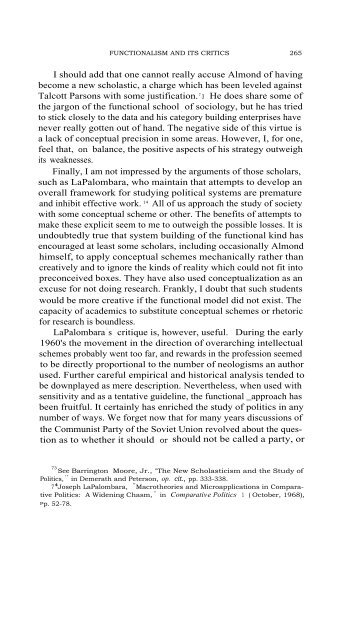FUNCTIONALISM AND ITS CRITICS - Intercollegiate Studies Institute
FUNCTIONALISM AND ITS CRITICS - Intercollegiate Studies Institute
FUNCTIONALISM AND ITS CRITICS - Intercollegiate Studies Institute
Create successful ePaper yourself
Turn your PDF publications into a flip-book with our unique Google optimized e-Paper software.
<strong>FUNCTIONALISM</strong> <strong>AND</strong> <strong>ITS</strong> <strong>CRITICS</strong> 265<br />
I should add that one cannot really accuse Almond of having<br />
become a new scholastic, a charge which has been leveled against<br />
Talcott Parsons with some justification. 7 3 He does share some of<br />
the jargon of the functional school . of sociology, but he has tried<br />
to stick closely to the data and his category building enterprises have<br />
never really gotten out of hand. The negative side of this virtue is<br />
a lack of conceptual precision in some areas. However, I, for one,<br />
feel that, on balance, the positive aspects of his strategy outweigh<br />
its weaknesses.<br />
Finally, I am not impressed by the arguments of those scholars,<br />
such as LaPalombara, who maintain that attempts to develop an<br />
overall framework for studying political systems are premature<br />
and inhibit effective work. 14 All of us approach the study of society<br />
with some conceptual scheme or other. The benefits of attempts to<br />
make these explicit seem to me to outweigh the possible losses. It is<br />
undoubtedly true that system building of the functional kind has<br />
encouraged at least some scholars, including occasionally Almond<br />
himself, to apply conceptual schemes mechanically rather than<br />
creatively and to ignore the kinds of reality which could not fit into<br />
preconceived boxes. They have also used conceptualization as an<br />
excuse for not doing research. Frankly, I doubt that such students<br />
would be more creative if the functional model did not exist. The<br />
capacity of academics to substitute conceptual schemes or rhetoric<br />
for research is boundless.<br />
LaPalombara ' s critique is, however, useful. During the early<br />
1960's the movement in the direction of overarching intellectual<br />
schemes probably went too far, and rewards in the profession seemed<br />
to be directly proportional to the number of neologisms an author<br />
used. Further careful empirical and historical analysis tended to<br />
be downplayed as mere description. Nevertheless, when used with<br />
sensitivity and as a tentative guideline, the functional _approach has<br />
been fruitful. It certainly has enriched the study of politics in any<br />
number of ways. We forget now that for many years discussions of<br />
the Communist Party of the Soviet Union revolved about the question<br />
as to whether it should or should not be called a party, or<br />
73 See Barrington Moore, Jr., "The New Scholasticism and the Study of<br />
Politics, " in Demerath and Peterson, op. cit., pp. 333-338.<br />
7 4 Joseph LaPalombara, " Macrotheories and Microapplications in Comparative<br />
Politics: A Widening Chasm, " in Comparative Politics 1 ( October, 1968),<br />
p p. 52-78.
















